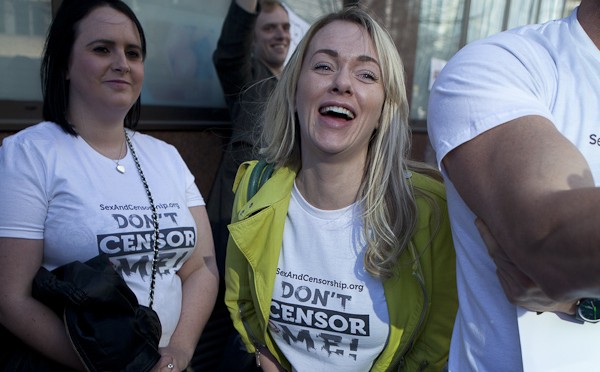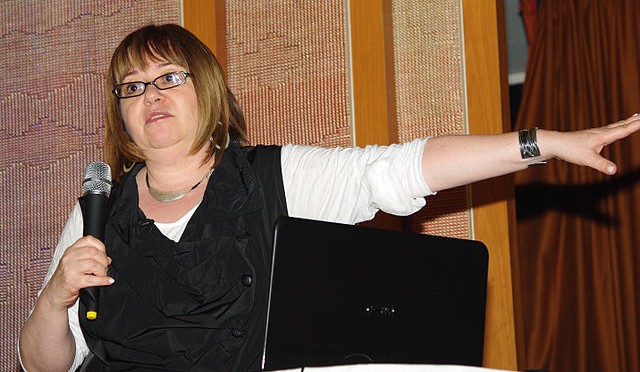On March 15, the Stop Porn Culture circus will come to London, representing a coalition of the loudest anti-sex and pro-censorship voices in the English-speaking world. Former pornstar Renée Richards calls on UK pornstars, strippers, models, sex workers and their supporters to take a stand and join us to protest against those who have, for so long, labelled and lied about the women in the sex industries.
When I woke up yesterday morning and saw the Stop Porn Culture event being tweeted, my first inclination was to get out the banners and sit on the Blackfriars Road for the next four weeks in angry anticipation. This was soon overcome with a worry; a worry that to protest outside the event would be conflicting with Sex and Censorship’s free speech ethos, and that surely if I were to protest outside the Stop Porn Culture’s conference then I would be trying to censor or prevent women such as Gail Dines, Julie Bindel and the women who speak on behalf of the organisation OBJECT, from achieving their goal of spreading their lies* and prejudices about the porn industry and sex workers.
So instead of trying to find my CND tent, I did what most Brits do and passively grumbled to my husband. “But if people don’t protest then surely this gives across the message that you don’t care? Silence can be read as compliance…” He followed this up with “anyway, you wouldn’t be protesting to silence them.” This soon had me flying back to my laptop keyboard and tweeting all of the porn performers I knew.
So if I’m not protesting to silence these women, then what I am I protesting for? Well, I’ll tell you:
-
Protecting Women
On Stop Porn Culture’s website it has a section called ‘Survivor Stories’ where, as you can imagine from the title, there are lots of accounts from women who have worked as sex workers within the porn industry, as strippers and/or as prostitutes. These accounts are all very harrowing and upsetting, and I am sure that they are real, but my annoyance is this: These things do not happen to all women who work as sex workers. I, and many, many other women I know who have worked and continue to work as sex workers in the porn industry, strip clubs and as prostitutes have not had these harrowing experiences.
This, of course, does not mean that these horrible events are okay just because they have only happened to some women. But instead of banning porn, which is what the women at the Stop Porn Culture conference would like to do, which would push the industry into an illegal terrain where human rights are not accounted for and more harrowing events could freely occur, we should be recognizing it for the legitimate industry that it is. I wish that the likes of Gail Dines, Julie Bindel and OBJECT would put as much effort into trying to unionise sex workers and creating better working environments for sex workers, as they are into trying to ban them.
-
Get your facts right!
So, again, I’m not protesting to silence the women at this conference, I’m protesting for these women to get their facts right.
The website also contains links to websites which state that new studies from Cambridge University that ‘MRI scans of test subjects who admitted to compulsive pornography use showed that the reward centres of the brain reacted to seeing explicit material in the same way as an alcoholic’s might on seeing a drinks advert.’ Therefore, porn is addictive, right? WRONG! Just because the self-identifying excessive users of ‘pornography show similar brain activity to alcoholics or drug addicts’ does not therefore mean that these excessive users are addicted, or that porn is addictive.
A problem with studies such as these is that the information provided, with words such as ‘similar brain activity’ are then removed to make the information more accessible, or palatable to those who have already made up their minds on the subject. So ‘a small test group of excessive porn users have an MRI scan and show similar brain activity to those who are addicted to alcohol and/or drugs’ which are not yet tested against other porn users who are not deemed as excessive users (what is excessive use anyway? And who gets to decide? Is watching three films a night excessive, or one film a week?)
Neither have these MRI scans taken place on a small test group of excessive porn users who claim not be addicted to pornography. So, the information gained by these limited experiments are then misinterpreted as ‘everyone who watches porn will become addicted’. If these continual studies show that porn is addictive to a small percentage of people, similar to that of alcohol being addictive to a small percentage of people, then surely this is not an argument against its ban. Unless of course the likes of Julie Bindel, Gail Dines and OBJECT think that the prohibition experiment of the United States between 1920 and 1933 worked, of course…
-
If I don’t object to OBJECT, who will?
This final point is probably the most important: We have the right to protest!
Both articles 10 and 11 of the Human Rights Act protect our rights to free speech and protest. We have the ‘right to speak freely and join with others peacefully, to express [our] views’. In this instance the pro-porn and/or the pro-sex industries’ voice is very rarely heard. Gail Dines is a well renowned author, Julie Bindel regularly writes for The Guardian and OBJECT are no stranger to protesting or speaking out. Yet the men and women who perform in adult films, prostitutes and lap dancers who are regularly spoken about are very rarely heard from themselves. This is our chance!
This is my rallying call… (if only I had a ‘XXX’ beacon to project into the sky à la Batman):
If you work within the sex industry and do not want to stop, do not want other people to speak on your behalf and do not feel as if you voice is being heard and/or want to protect your job, then join us outside the Stop Porn Culture conference on 15 March from 3pm till 5pm.
Location: Outside Wedge House, 36-40 Blackfriars Road, Southwark, London, SE1 8PB
Join the event page on Facebook.
See you there!
Renée x
* I use the word ‘lies’ because some of the ‘facts’ that I’ve read on the SPC website are completely unfounded, and through empirical evidence of my experience as a porn performer, I find these not to be true. And ‘prejudices’ because the definition of this word is ‘preconceived opinion that is not based on reason or actual experience’.




